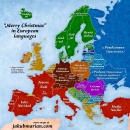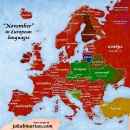 |
Origin of the word “kid”
The noun “kid” in contemporary English is mostly used to informally refer to a child, e.g. “she’s just a kid” or “only 90s kids will (...)
May 12, 2018 – Jakub Marian – English
|
 |
Estimate of the number of native Polish speakers
Different sources give very different estimates for the number of native Polish speakers, ranging from 39 million to 55 million, and they (...)
May 9, 2018 – Jakub Marian – Language learning
|
 |
Duolingo: Number of users per language statistics
Duolingo is a platform where you can learn many different foreign languages for free. It’s a great way to start learning a language you (...)
April 24, 2018 – Jakub Marian – Language learning
|
 |
‘Merry Christmas’ in European languages
A map showing how to wish people a “Merry Christmas” in French, German, Spanish, Italian and other European languages. (...)
December 17, 2017 – Jakub Marian – Maps
|
 |
English words that change their meaning depending on stress placement
English orthography is often ambiguous. For example, the word “read” can be pronounced either /riːd/ (“reed”) or as /rɛd/ (“red”) (...)
November 27, 2017 – Jakub Marian – English
|
By the way, have you already seen my brand new web app for non-native speakers of English? It's based on reading texts and learning by having all meanings, pronunciations, grammar forms etc. easily accessible. It looks like this:
 |
‘November’ in European languages
The Roman calendar started in March, not January, making November the ninth month of the year—hence the name, from Latin novem, “nine”. (...)
November 2, 2017 – Jakub Marian – Maps
|
 |
Present subjunctive in English
The present subjunctive is a really easy mood to use: it is always identical to the infinitive in English, and speakers of other Germanic (...)
November 1, 2017 – Jakub Marian – English
|
 |
“Criteria” – singular or plural?
The media seem to have been plagued with expressions like “the criteria is” lately. Unfortunately, such expressions are incorrect because (...)
October 16, 2017 – Jakub Marian – English
|
 |
‘In formal context’ vs. ‘in a formal context’ in English
“Context” can be a countable as well as an uncountable noun. When you speak about context in general, the word is usually uncountable, (...)
October 6, 2017 – Jakub Marian – English
|
 |
So, thus, therefore, and hence in English
Since you are reading this article in English, the odds are you already know what the conjunction “so” means. You probably also know that (...)
October 5, 2017 – Jakub Marian – English
|

